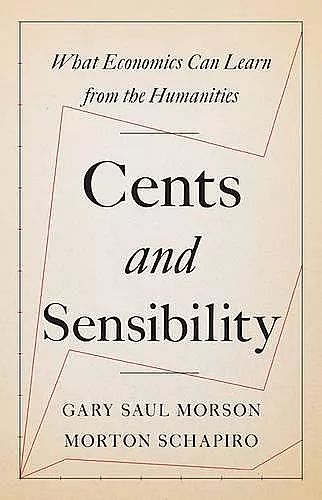Cents and Sensibility
What Economics Can Learn from the Humanities
Gary Saul Morson author Morton Schapiro author
Format:Hardback
Publisher:Princeton University Press
Published:13th Jun '17
Currently unavailable, and unfortunately no date known when it will be back

A provocative and inspiring case for a more humanistic economics Economists often act as if their methods explain all human behavior. But in Cents and Sensibility, an eminent literary critic and a leading economist make the case that the humanities, especially the study of literature, offer economists ways to make their models more realistic, their predictions more accurate, and their policies more effective and just. Gary Saul Morson and Morton Schapiro trace the connection between Adam Smith's great classic, The Wealth of Nations, and his less celebrated book on The Theory of Moral Sentiments, and contend that a few decades later Jane Austen invented her groundbreaking method of novelistic narration in order to give life to the empathy that Smith believed essential to humanity. Morson and Schapiro argue that Smith's heirs include Austen, Anton Chekhov, and Leo Tolstoy as well as John Maynard Keynes and Milton Friedman. Economists need a richer appreciation of behavior, ethics, culture, and narrative--all of which the great writers teach better than anyone. Cents and Sensibility demonstrates the benefits of a freewheeling dialogue between economics and the humanities by addressing a wide range of problems drawn from the economics of higher education, the economics of the family, and the development of poor nations. It offers new insights about everything from the manipulation of college rankings to why some countries grow faster than others. At the same time, the book shows how looking at real-world problems can revitalize the study of literature itself. Original, provocative, and inspiring, Cents and Sensibility brings economics back to its place in the human conversation.
"Focusing mostly on integrating exposure to great realist novels (such as Anna Karenina, Middlemarch, and War and Peace) into economics education, the authors use three case studies on, respectively, higher education, the family, and the economic development of nations to make an insightful and compelling argument. Morson and Schapiro succeed in finding new ways of thinking about big issues as well as new ways to read classic novels... The case studies read like popular nonfiction. There's immense joy to be found throughout this work on thinking with creativity and passion."--Publishers Weekly
ISBN: 9780691176680
Dimensions: unknown
Weight: 454g
320 pages